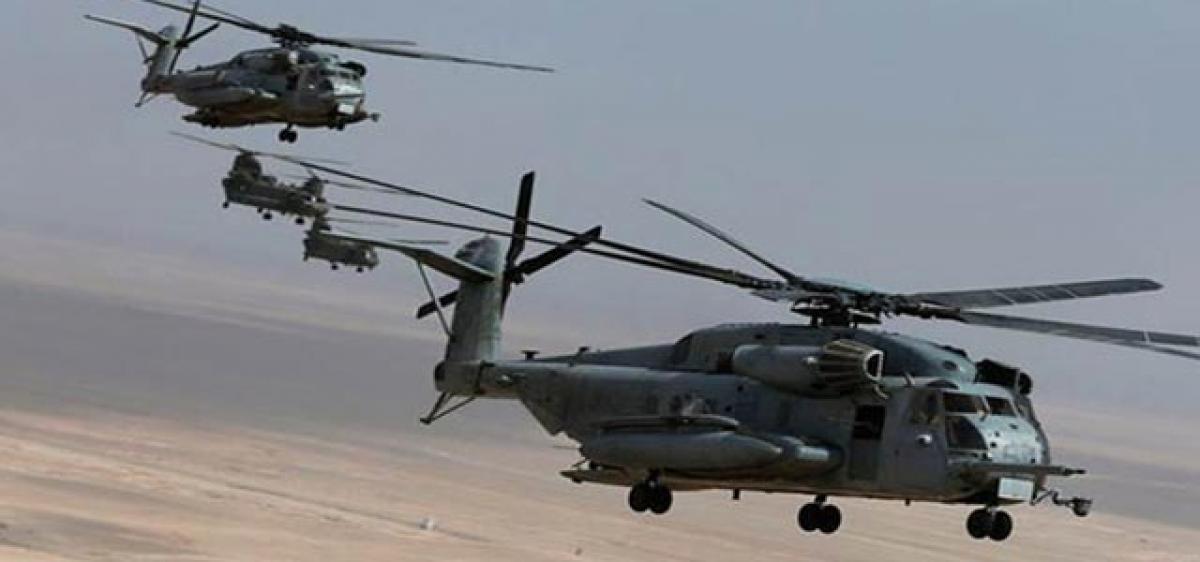Can India's defence deals be foolproof?

Predictably, all hell broke lose in New Delhi on Friday when the CBI arrested former Air Force Chief SP Tyagi, his cousin and lawyer-businessman Gautam Khaitan in connection with the Agusta Westland VVIP helicopter deal.
History repeats itself a la Bofors. Today, the Rs 64 crores have magnified to the Rs 3,600-crores Choppergate. Both standing testimony to military perfidy. Leaving one angry and astonished about the power of greed, over and over again. In a sinking morass of déjà vu!
Predictably, all hell broke lose in New Delhi on Friday when the CBI arrested former Air Force Chief SP Tyagi, his cousin and lawyer-businessman Gautam Khaitan in connection with the Agusta Westland VVIP helicopter deal. His crime? Changing the IAF’s service ceiling of the helicopters from 6,000 metres to 4,500 metres. The first time that a military chief, retired or serving, has been arrested for corruption totaling Rs 362 crores in defence procurement.
Recall, in 2010 India signed a contract with Augusta Westland, Finmeccanica’s subsidiary for procuring 12 helicopters to ferry VVIPs but cancelled the deal in January 2014 “on grounds of breach of the pre-contract integrity pact and the agreement” by AWIL. Thanks to the Italian government arresting Finmeccanica’s CEO for paying Rs 362 crores as bribes to bag the deal.
Undeniably, Tyagi’s arrest has again opened the Pandora’s Box on murky defence deals and raises uncomfortable questions: Who finalised and signed the VVIP chopper deal? Does the helicopter deal have any link to the Congress? Is this one part of BJP’s agenda of Congress-mukt Bharat?
How is Tyagi connected to real estate company Emaar-MGF owned by Rahul-confidant Kanishka Singh’s relatives? Why should security agencies require a separate expensive fleet of helicopters for VVIPs? Even President Obama refused to buy Westland as they were exorbitantly costly, choosing to fly in regular planes.
More. Choppergate has again exposed the shadowy world of arms dealers or interventionists and their political patronage. It is the same cast of middlemen and agents whose power remains intact no matter who rules India.
Succinctly, ‘agents’ have always been an ‘unofficial’ part of our defence sector, be it Quottrocchi in the Bofors Howitzer guns, Nanda’s in HDW Submarine deal, Choudhrie in the Barrack Anti Missile System contract, Abhishek Verma of German arms supplier SIG Sauer fame languishing in Tihar jail for the 2006 Navy war room case et al.
Alongside, the key to nailing a coveted contract is cultivating powerful bureaucrats connected with a deal and who are close to the powers-that-be. Besides, they are suitably “rewarded” in cash and kind after the job is done besides getting coveted posts after their retirement.
Pertinently, post the Bofors scandal in the late 80’s, middlemen were banned for years. In 2003, a report recommended legalising middlemen and making negotiations transparent, but it failed to end corruption as no agent registered with the government.
Today, under Modi Raj, the government is willing to give conditioned and limited approval to dealing with banned defence firms. Primarily, to boost defence procurement at a time when the country needs critical technology and equipment systems but faces hurdles with many foreign manufacturers finding it difficult to negotiate the Indian environment and the language.
Over two years ago Defence Minister Parrikar asserted that a new government policy legalizing middlemen in arms purchases would be in place soon. Adding, “The middle men have to be declared and their commission cannot be linked to the outcome of negotiations.” The agents would also be allowed to participate in meetings to help the company they represent, since it may not be possible for official representatives to attend all meetings in India.
Yet, the NDA cancelled the purchase of mine sweeper ships - which the Navy needs desperately for the security of its ports after the South Korean manufacturer told the government that it had used the services of a Delhi-based agent for his English-speaking skills. Sic.
Scandalously, the functioning of the Defence Ministry has shown a consistent inability to organise an efficient, foolproof and transparent system of procurement and an effective operative procedure that would automatically take follow-up action on allegations of corruption, without waiting for Ministers to do so.
If India wants to come out of this cycle of scams it needs to find a way that the best defence equipment is purchased without fraud or kickbacks. Our leaders must stop being the world’s largest importer of arms and instead start indigenous procurement. Towards that end we must create a robust military-industrial complex, restructure its engineering curriculum, procurement procedures et al.
By Poonam I Kaushish











